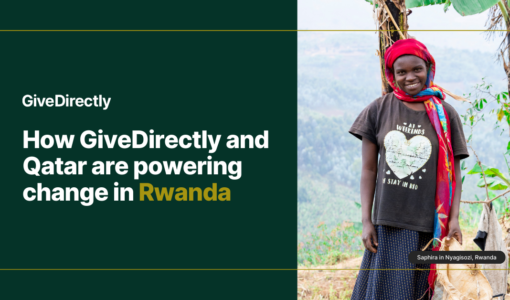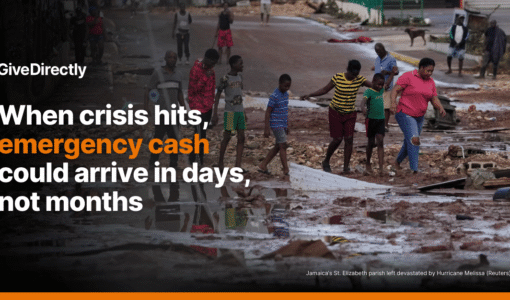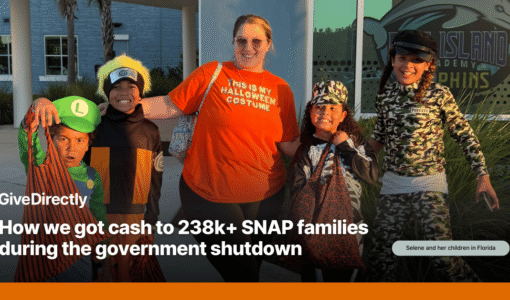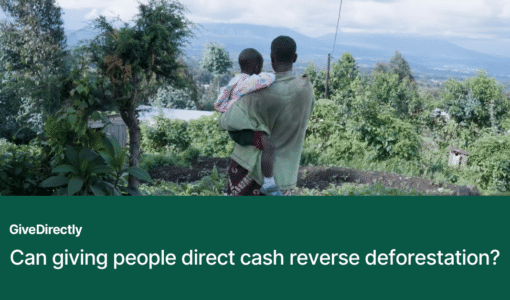Devex reported on our pilot programs in the Democratic Republic of Congo (DRC) and Malawi that deliver direct cash transfers to pregnant women and families with young children to reduce maternal and child mortality. The article highlights how cash is helping families afford food, health care, and other essentials, enabling healthier pregnancies and better early childhood outcomes.
or scroll down to read a copy of it.
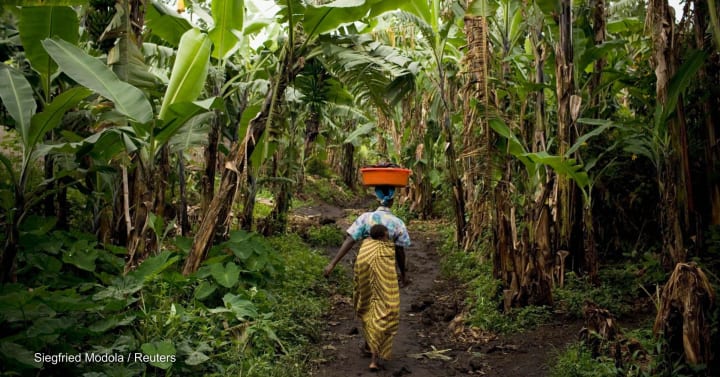
By David Njagi
08 May 2025
Every year, around 178,000 mothers in Africa die from complications related to childbirth. For their babies, the odds are just as dire: 1 million newborns die in the region each year.
According to Miriam Laker, a medical doctor and researcher working with the global charity GiveDirectly, traditional aid has made progress in terms of reducing maternal and child mortality. But many of the solutions were one-sided, meaning they failed to address the problem in totality.
“In sub-Saharan Africa, majority of the problems that mothers and babies face are related to either lack of services that they need to live healthily or lack of access to those services. Even in situations where health facilities might be present, the services are not free of charge,” Laker said.
As traditional aid models face funding cuts and health systems grow more fragile, experts are rethinking how to deliver help to the most vulnerable. One promising solution: GiveDirectly is piloting direct cash transfers to pregnant women and families with young children.
Cash as a lifeline
In many African countries, families finance roughly 40% of health services out of pocket, according to the Resilience Action Network Africa, or RANA. This forces painful trade-offs: choosing between food and hospital bills, or selling land to afford medication, Aggrey Aluso, executive director at RANA, said.
“The gap is in a health system that is not covering everybody, and that creates a challenge where people have to find resources because ill health does not choose when you have capability to pay,” Aluso explained.
To plug these gaps, GiveDirectly is testing a direct funding model aimed at the root causes: poverty and access. The organization is piloting programs in the Democratic Republic of Congo and Malawi, which have shown positive results. A previous project in Kenya also found that infant and child mortality went down by about 46% among families that received unconditional cash.
In DRC’s South Kivu province, where over 70% of children need nutritional support, pregnant women and young children from 4,805 households are receiving $1,370 each over two years. The money is helping mothers afford nutritious food, settle hospital and school bills, while also diversifying family assets like buying land where they can settle down and invest in income-generating enterprises.
“I received the first $40 and immediately paid the hospital fees. I also bought a mattress to sleep on, so no more sleepless nights because of back pains. I hope I won’t have any complications with my pregnancy because I am eating well,” said 24-year-old Alliance from the DRC.
In the Malawi pilot, GiveDirectly is partnering with Save the Children to test whether combining cash with nutrition education can improve nutritional outcomes in the first 1,000 days of a child’s life.
With cash in their pockets, vulnerable families can reduce child stunting and mortality, and increase vaccination rates, because they can make big investment decisions, including paying school fees ahead of time, starting a business, or buying farmland, Tyler G Hall, the director of communications at GiveDirectly, said.
“When people have a large lump sum of money, they can sustainably provide for their children beyond just two years of stabilization. This is extremely exciting to know we could be reducing such issues as premature deaths for children, increasing safer births for mothers, and better child development,” Hall said.
Questions around sustainability
Beyond the lifesaving results, advocates argue that cash transfers address gaps in traditional aid models, including transparency, accountability, and efficiency.
“The single greatest advantage of cash transfers is that the impact is very traceable and proven. They are very cost-effective, creating improvement to child and maternal well-being, and that traceable impact is the most important question for people wanting to do good in the world right now,” Hall said.
With global donors increasingly focused on measurable results, the ability to show clear, documented impact may be cash aid’s strongest selling point, he said.
However, some development experts argue that cash transfers are not a silver bullet to solving maternal and newborn problems because they are not sustainable. Instead, what Africa needs is strong health systems that provide diagnosis, medication, and nutrition, according to Evaline Kibuchi, the chief national coordinator, Stop TB Partnership-Kenya.
Strong health systems should, for instance, equip people with health insurance to cushion them from catastrophic health expenditures. In Africa, health insurance provided by both governments and the private sector covers less than 20% of the population.
“Cash transfers only target families that are listed as struggling. The support is good, but we all know donor funds come to an end. It is not sustainable because at some point it is going to stop,” Kibuchi said.
